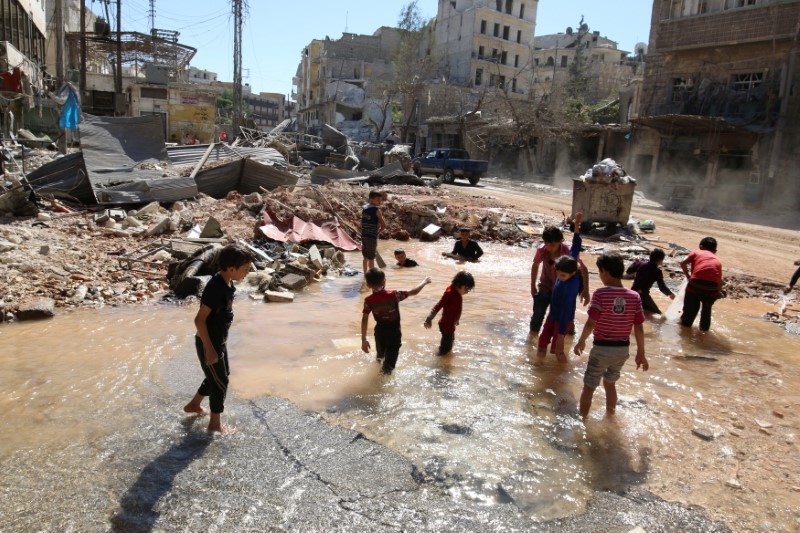
By Jack Stubbs and Maria Tsvetkova
MOSCOW (Reuters) – Russia has built up its forces in Syria since a ceasefire collapsed in late September, sending in troops, planes and advanced missile systems, a Reuters analysis of publicly available tracking data shows.
The data points to a doubling of supply runs by air and sea compared to the nearly two-week period preceding the truce. It appears to be Russia’s biggest military deployment to Syria since President Vladimir Putin said in March he would pull out some of his country’s forces.
The increased manpower probably includes specialists to put into operation a newly delivered S-300 surface-to-air missile system, military analysts said.
The S-300 system will improve Russia’s ability to control air space in Syria, where Moscow’s forces support the government of President Bashar al-Assad, and could be aimed at deterring tougher U.S. action, they said.
“The S-300 basically gives Russia the ability to declare a no-fly zone over Syria,” said Justin Bronk, a research fellow at the Royal United Services Institute (RUSI) in London.
“It also makes any U.S. attempt to do so impossible. Russia can just say: ‘We’re going to continue to fly and anything that tries to threaten our aircraft will be seen as hostile and destroyed’.”
Russia’s Defence Ministry did not respond to written questions. A senior air force official, speaking on condition of anonymity, dismissed talk of an increase in supply shipments.
But data collated by Turkish bloggers for their online Bosphorus Naval News project, and reviewed by Reuters, shows reinforcements sent via Russia’s “Syrian Express” shipping route from the Black Sea increased throughout September and have peaked in the last week.
The data shows 10 Russian navy ships have gone through the Bosphorus en route to Syria since late September, compared with five in the 13-day period before the truce — from Aug. 27 to Sept. 7.
That number includes The Mirazh, a small missile ship which a Reuters correspondent saw heading through the Bosphorus toward the Mediterranean on Friday.
Two other Russian missile ships were deployed to the Mediterranean on Wednesday.
Some of the ships that have been sent to Syria were so heavily laden the load line was barely visible above the water, and have docked at Russia’s Tartus naval base in the Western Syrian province of Latakia. Reuters has not been able to establish what cargo they were carrying.
Troops and equipment are also returning to Syria by air, according to tracking data on website FlightRadar24.com.
Russian military cargo planes flew to Russia’s Hmeymim airbase in Syria six times in the first six days of October — compared to 12 a month in September and August, a Reuters analysis of the data shows.
INCREASED ACRIMONY
Russia sent its air force to support the Syrian Army a year ago when Moscow feared Assad was on the point of succumbing to rebel offensives. U.S.-led forces also carry out air strikes in Syria, targeting Islamic State positions.
Aerial bombardments in the past two weeks, mainly against rebel-held areas in the Syrian city of Aleppo, have been among the heaviest of the civil war, which has killed more then 300,000 people in 5-1/2 years.
Since the collapse of the ceasefire in September, acrimony between the United States and Russia has grown and Washington has suspended talks with Moscow on implementing the truce.
U.S. officials told Reuters on Sept. 28 that Washington had started considering tougher responses to the assault on Aleppo, including the possibility of air strikes on an Assad air base.
“They (Russia) probably correctly surmise that eventually American policy will change,” Bronk said, commenting on the analysis of the tracking data.
“They are thinking: ‘We’re going to have to do something about this, so better to bring in more supplies now … before it potentially becomes too touchy’.”
The FlightRadar24.com data shows Ilyushin Il-76 and Antonov An-124 cargo planes operated by the Russian military have been flying to Syria multiple times each month. It offers no indication of what the aircraft are carrying.
But the Il-76 and An-124 transporters can carry up to 50 and 150 tonnes of equipment respectively and have previously been used to airlift heavy vehicles and helicopters to Syria.
State-operated passenger planes have also made between six and eight flights from Moscow to Latakia each month. Western officials say they have been used to fly in troops, support workers and engineers.
Twice in early October, a Russian military Ilyushin plane flew to Syria from Armenia. Officials in Yerevan said the planes carried humanitarian aid from Armenia, a Russian ally.
Russia’s Izvestia newspaper reported last week that a group of Su-24 and Su-34 warplanes had arrived at the Hmeymim base in Syria, returning Russia’s fixed-wing numbers in the country to near the level before the drawdown was announced in March.
(Additional reporting by Hasmik Mkrtchyan in Yerevan and Murad Sezer in Istanbul, Writing by Jack Stubbs, Editing by Christian Lowe and Timothy Heritage)












